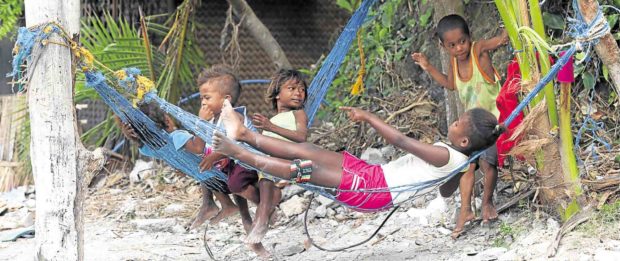
ANCESTRAL LAND Young members of the Ati tribe in Boracay have been exposed to rapid development of areas surrounding their ancestral land at Barangay Manoc-Manoc, with many of their elders finding work in local commercial establishments.—LYN RILLON
BORACAY ISLAND, Aklan — Even as President Rodrigo Duterte has announced that most lands on Boracay Island will be subjected to land reform, the Ati tribe, the indigenous peoples’ group whose members are the main intended beneficiaries, is not sure of returning to farming.
“Only our elders want to have farm lands and to farm again. Most of us do not know how to farm,” said Evangeline Tambuon, a council member of the Boracay Ati Tribal Organization who belongs to the fifth generation of Ati living on the island.
Many tribe members worked in hotels and resorts and as laborers before the island was closed to tourists for a six-month rehabilitation on April 26.
But Tambuon said they would still get the consensus of members before the tribe would decide on the government offer of land reform.
The tribe is composed of 50 families with 214 members.
Earliest inhabitants
Anthropological studies have backed up claims that the Ati were the earliest inhabitants of the island even before the Visayans and the Spanish colonizers came.
The government, through the National Commission on Indigenous Peoples, issued in 2011 a certificate of ancestral domain title (CADT) to the tribe covering a 2.1-hectare beach front property at Barangay Manoc-Manoc, one of three villages of Boracay.
The community occupies only a portion of the CADT-covered property due to ownership disputes.
The Department of Agrarian Reform (DAR) earlier announced that the government planned to distribute 868 of 1,032 ha on the island for land reform for tribe members.
The three-phase distribution would cover 25 ha that are free of structures for the first phase, 220 ha for the second phase, and 623 ha for the third phase.
NO MORE CROWDS Only a few residents and tourists are left to enjoy Boracay’s beaches on May 1 after the government shut down the island for a six-month rehabilitation.—LYN RILLON
Alarmed
Many residents and property owners in Boracay have questioned the government plan on the country’s prime tourist destination. Business operators and expatriates have also been alarmed over the plan announced by Mr. Duterte.
“What will happen to us and our land that our family has been paying taxes for generations,” a tricycle driver said.
While he supported the rehabilitation of the island and the removal of illegal structures, he said residents and property owners who had worked hard and followed the law should not be driven out.
“We are confused and concerned with the pronouncement. We have been fully supporting the government’s efforts because we want a better and new Boracay (that has) a sustainable tourism industry. But we do not know what is the real plan for the island,” said Nenette Aguirre-Graf, president of the business group Boracay Foundation Inc.
The militant Kilusang Magbubukid ng Pilipinas (KMP) said Mr. Duterte’s “obsessive fixation with Boracay Island shows his myopic view and attitude toward agrarian reform, its importance in addressing the demands of Filipino farmers, and in developing the national economy.”
The KMP also assailed Mr. Duterte for declaring the island a land reform area while failing to dismantle big landholdings.